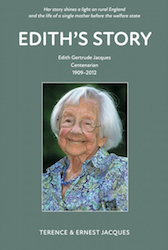Edith Jacques lived from 1909 until 2012. Her twin sons, Terrance and Ernie, were born in 1938 and, at the age of 84, have written a fine biography of their mother. HARRY BARNES reflects on what we can learn from this tough but enthralling story.
Edith’s Story is particularly telling and hopefully will help to start a new trend in the writing of biographies. Most biographies focus on people we already know about – from prominent heroes such as Nelson Mandela to villains such as Adolf Hitler. Few working class people get biographical coverage, but reading about the social and personal problems they had to tackle can tell us much about our society.
 Edith Jacques handled her hardships in an impressive way. She was faced with especially harsh conditions from the moment of her birth until the post-1945 social improvements that came with the emergence of the welfare state, opportunities that made a huge difference to her life.
Edith Jacques handled her hardships in an impressive way. She was faced with especially harsh conditions from the moment of her birth until the post-1945 social improvements that came with the emergence of the welfare state, opportunities that made a huge difference to her life.
She came from a long line of families in which the men were agricultural labourers, including her father, who died when she was 10. The following year her mother broke her back and was bed ridden for the rest of her life.
Edith had to give up school to look after her disabled mother and her younger brother as her four elder sisters had already left home to become domestic servants, the main form of employment open to women at the time. Her four older brothers were agricultural labourers.
As well as nursing her mother and doing the housework, Edith grew vegetables to eat and sell. Even after she married a farm labourer at 18, she continued to help her mother and mother-in-law, who also became ill and was eventually taken into a workhouse at York, the area where Edith lived.
After her mother and mother-in-law died, Edith settled for a while into a more normal life, starting her own family with a son. In 1938, she gave birth to the twins. But disaster struck again when her husband was hit by torrential rain as he cycled to record their births, and died just a fortnight later.
Hardship & achievement
Edith struggled on, finding work at nearby RAF Clinton where she did nine-hour shifts, six days a week. Looking after her young twins became increasingly difficult and in 1941, she placed them in a Dr Barnardos home in York, hoping she would be able to see them regularly.
But the twins were shunted from place to place, and almost ended up in Australia. They were moved 13 times, sent to places as far apart as Dumfries and Essex, and Edith struggled to keep in touch with them, despite sending letters and attempting to visit them when she could. Only in 1943 did she finally manage to see them in Scotland, and two years later in Sussex.
In 1947, Edith started a new job at Rowntrees factory in York, and eventually became a trade union representative. She had by then moved into a council house. She took in a lodger and was finally in a position to reclaim her twins from Barnardos.
With Edith’s help and influence, both twins went on to gain degrees via the Open University.
We need more books like this, recording the hardships and achievements of working class parents. Such works tell us much that we need to know about how our society was shaped, much more than biographies of the high and mighty.
This is a compelling story of some 400 pages describing Edith’s extremely tough but enthralling life. It is a long time since I have read a biography so quickly.
—-
Harry Barnes is the former Labour MP for North East Derbyshire.
He blogs at ‘Three Score Years and Ten’ and is an active member of the Dronfield Labour Party discussion forum, ‘Dronfield Blather’.
His own efforts to write about his parents can be read here and here.


